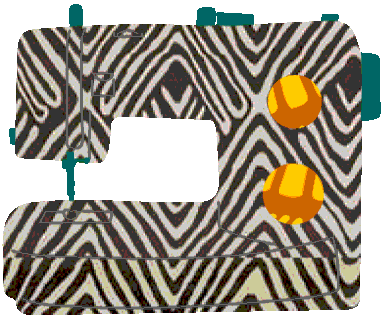Berabose Designs: Making fashion technology work for sustainability
Berabose Designs is one of the brands that made it as a finalist of the third edition of the Fashionomics Africa Contest. The United Nations Environment Programme (UNEP), which was part of the contest jury, expressed its delight in seeing a real increase in the quality of applications and noted that the three finalists are true testimonials of the bubbling textile scene on the African continent and the power that circular business models represent.
Berabose Designs has positioned itself at the forefront of the fashion technology revolution, by producing sustainable garments made by combining natural sustainable practices with 3D production modelling. In this week’s article we learn more about how Berabose Designs wowed the Fashionomics Africa Contest judges, through its unique business model, which is founded on sustainability, innovation, and inclusion.
About Berabose Designs
Berabose Designs is a Rwandan-based business founded by Elisabeth Berabose. It is focused on the production of innovative garments made from organic cotton, dyed with agricultural waste and plant-based dyes. Optimization of the fashion design process is a defining feature of how the sustainable brand operates. After successfully launching its ‘27’ collection, the brand recognized the need to meet unique consumer’s needs through custom clothing. However, traditional custom-made methods posed challenges such as multiple interactions, fittings, and fabric selection time, especially without proper infrastructure. In response to these problems, Berabose Designs developed a three-phased strategy that combines its expertise in 3D product modeling with cutting-edge technology. The process includes a digitized custom-making process that allows users to easily select fabric, style, color, and measurements online, and a digital fitting room where consumers can model their looks based on their body shape and measurements.
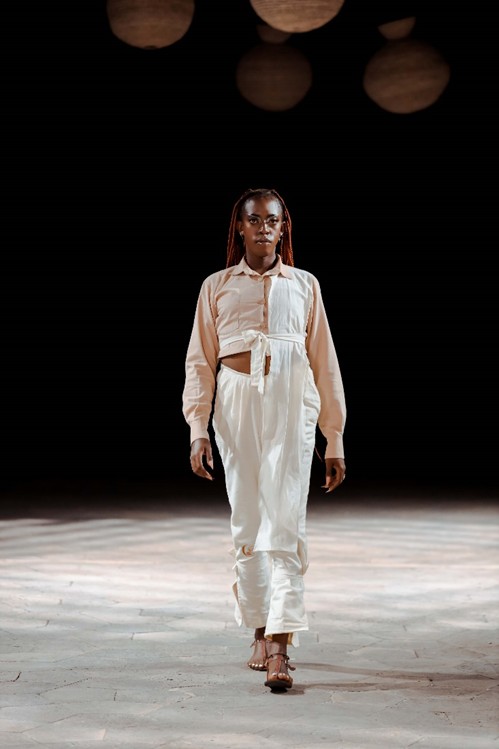
Development of this process was a leap of faith, in which Berabose took a chance on fashion technology which is practically non-existent, despite research that has shown its promise. Berabose Designs adopted use of fashion technologies that use algorithms to derive a shopper's 3D body shape using augmented reality to make personalized product recommendations. The technology adds value because it allows to measure its impact. It presents a higher conversion rate, average order value, and consumer loyalty, all of which increase Berabose Designs capacity for a bigger market. The brand’s digitization strategy has positioned Berabose as a pioneer for sustainable design solutions on the continent and globally.
“Fashion technology has the potential to revolutionize the industry, and we are proud to be at the forefront of this change.” - Elisabeth
In addition to the use of fashion technology, Berabose has adopted a number of sustainability practices in line with its ethos. For example, Berabose designs clothes with an average lifespan of three years – a move which is critical in reducing the environmental impact of the brand’s products. Furthermore, its use of organic dyes and cotton, ensures the biodegradability of the brand’s garments. Berabose has also implemented a program encouraging consumers to bring old clothing in for upcycling. These initiatives will help reduce the amount of clothing waste produced by approximately 30% over the next three years. The brand is also intentional about avoiding prints and patterns, so as to discourage trends and consequently fast fashion.
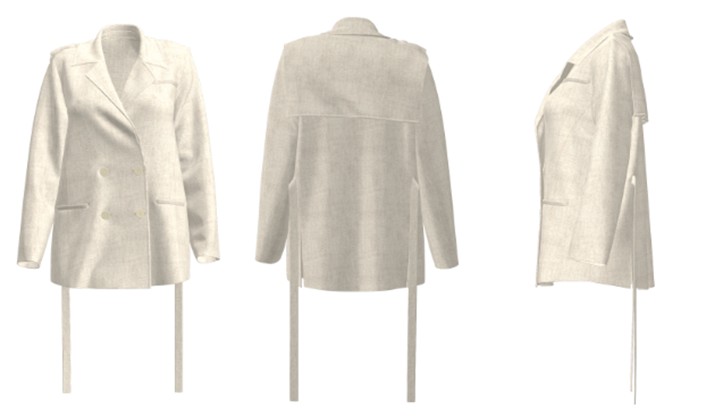
The cotton used in the production of Berabose’s designs is sourced from a cooperative in Tanzania. After sourcing, Berabose collaborates with local facilities in Rwanda for spinning and weaving. By working with local sustainable partners, they save gallons of water and reduce energy use. Additionally, they collaborate with Handspun Hope for the dyeing of the clothes, using plant-based dyes and agricultural waste to reduce the amount of water, energy, and chemicals used in the dyeing process. For packaging and distribution, Berabose has put in measures to reduce waste and carbon footprint. For instance, they offer a 10% discount for customers who return and reuse their delivery bags. In place of paper, the brand uses banana barks as clothing tags. Their distribution model is also based online, reducing the need for physical stores which contribute to greenhouse emissions.
Women’s empowerment is also at the heart of Berabose Designs. In fact, the brand’s ‘27’ collection honored the several women who influenced Elisabeth’s entrepreneurial journey, as each of the pieces was named after those honorable ladies.
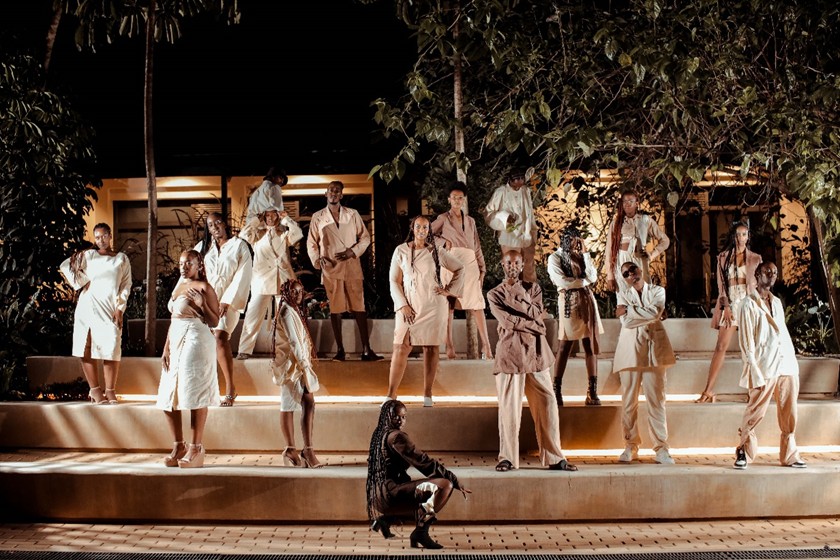
“My empowerment journey was made possible thanks to the amazing women surrounding me. Friends, sisters, mentors and family members. Naming each piece of the ‘27’ collection after the women who’ve had a substantial influence in my life was my way to show them my appreciation for helping me becoming who I am today” - Elisabeth
As part of its inclusive employment strategy, the brand recruits and trains informal female workers. For the sewing process in particular, Berabose employs only women, with the aim of providing them with a steady income and financial security. This not only helps to promote gender equality and women’s economic empowerment within the community, but it also creates a sustainable system that benefits women and their dependents.
Raising awareness on the importance of sustainability in fashion
The brand also has a cocktail of sustainability initiatives aimed at increasing customers’ knowledge on sustainability. Through its social media platforms, Berabose educates consumers and encourages eco-friendly behaviors. They also provide information on how to take measurements to avoid commute time from their consumers, and textile waste due to misfits. They also created a slow fashion series to inform consumers about fast fashion's environmental and social consequences and tips to avoid them. Some of their posts are dedicated to mixing and matching items to help consumers realize different looks.
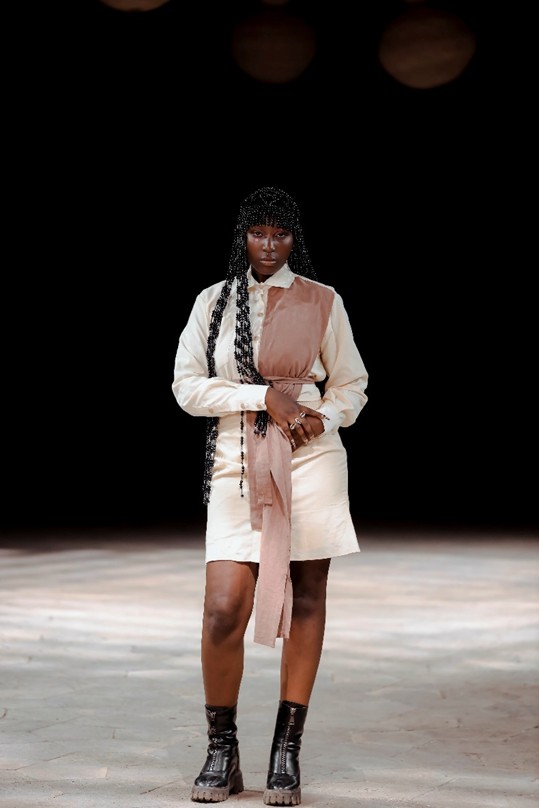
About being a finalist of the Fashionomics Africa Contest
Berabose Designs was elated to have been part of the finalists for the Fashionomics Africa Contest. Making it to the finals of the competition has helped to validate their efforts and reflected the value of the work that the brand is doing.
"Being a finalist in the Fashionomics Africa contest is not only an honor for Berabose Designs, but also a testament to our commitment to promoting African fashion to a global audience. We are grateful for this opportunity to showcase our team’s work, share our journey and vision for sustainable fashion with the world." - Elisabeth
The Fashionomics Africa Contest awards the finalists with a package of prizes that includes a branding kit, promotion actions to gain visibility as well as mentorship and networking opportunities to facilitate business growth.
Overall, Berabose's sustainable business model focuses on reducing the environmental impact of their products through sustainable sourcing, upcycling, biodegradability, and encouraging eco-friendly behaviors. They also focus on innovation, particularly technology utilization, which positions them as a pioneer for sustainable design solutions.
To view more of Berabose Designs’ incredible work, visit their website.
